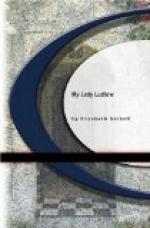“I saw what was in his mind. He was fretting and chafing to go to his cousin’s assistance; but the thought of his mother restrained him. I would not have kept back Urian from such on errand at such a time. How should I restrain him? And yet, perhaps, I did wrong in not urging the chances of danger more. Still, if it was danger to him, was it not the same or even greater danger to her?—for the French spared neither age nor sex in those wicked days of terror. So I rather fell in with his wish, and encouraged him to think how best and most prudently it might be fulfilled; never doubting, as I have said, that he and his cousin were troth-plighted.
“But when I went to Madame de Crequy—after he had imparted his, or rather our plan to her—I found out my mistake. She, who was in general too feeble to walk across the room save slowly, and with a stick, was going from end to end with quick, tottering steps; and, if now and then she sank upon a chair, it seemed as if she could not rest, for she was up again in a moment, pacing along, wringing her hands, and speaking rapidly to herself. When she saw me, she stopped: ‘Madame,’ she said, ’you have lost your own boy. You might have left me mine.’
“I was so astonished—I hardly knew what to say. I had spoken to Clement as if his mother’s consent were secure (as I had felt my own would have been if Urian had been alive to ask it). Of coarse, both he and I knew that his mother’s consent must be asked and obtained, before he could leave her to go on such an undertaking; but, somehow, my blood always rose at the sight or sound of danger; perhaps, because my life had been so peaceful. Poor Madame de Crequy! it was otherwise with her; she despaired while I hoped, and Clement trusted.
“‘Dear Madame de Crequy,’ said I, ’he will return safely to us; every precaution shall be taken, that either he or you, or my lord, or Monkshaven can think of; but he cannot leave a girl—his nearest relation save you—his betrothed, is she not?’
“‘His betrothed!’ cried she, now at the utmost pitch of her excitement. ’Virginie betrothed to Clement?—no! thank heaven, not so bad as that! Yet it might have been. But mademoiselle scorned my son! She would have nothing to do with him. Now is the time for him to have nothing to do with her!”
“Clement had entered at the door behind his mother as she thus spoke. His face was set and pale, till it looked as gray and immovable as if it had been carved in stone. He came forward and stood before his mother. She stopped her walk, threw back her haughty head, and the two looked each other steadily in the face. After a minute or two in this attitude, her proud and resolute gaze never flinching or wavering, he went down upon one knee, and, taking her hand—her hard, stony hand, which never closed on his, but remained straight and stiff:
“‘Mother,’ he pleaded, ‘withdraw your prohibition. Let me go!’




